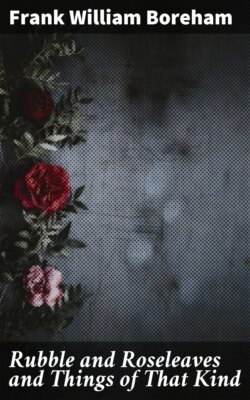Читать книгу Rubble and Roseleaves and Things of That Kind - Frank William Boreham - Страница 18
На сайте Литреса книга снята с продажи.
III
ОглавлениеTable of Contents
Alec Crosby, however, is not so sure. 'A dead lion,' he points out, 'has been a living lion, while the living dog will be a dead dog some day.' There is something in that. He means, if I rightly catch the drift of his philosophy, that you can pay too much for the privilege of being alive. Everything else has its price, and most of us buy our goods on too high a market. One man pays too much for popularity; he sells his conscience for it. Another pays too much for fame; it costs him his health. A third buys his money too dearly; in gaining the whole world he loses his own soul. And in the same way, a man may pay too much even for life itself. The dog, as Alec Crosby probably knew, is usually employed in Oriental literature as an emblem of the contemptible; the dog in our modern sense—Rover, Carlo and the rest—is unknown. The lion, on the other hand, is invariably the symbol of the courageous. Alec thinks that, all things considered, it is better to be a dead hero than a living coward. Alec reminds me of Artemus Ward. On the day of a general election, Artemus entered a polling-booth and began to look about him in evident perplexity. The returning officer approached and offered to help him.
'For whom do you desire to vote?' he asked.
'I want to vote for Henry Clay!' replied Artemus Ward.
'For Henry Clay!' exclaimed the astounded officer, 'why, Henry Clay has been dead for years!'
'Yes, I know,' replied Artemus Ward, 'but I'd rather vote for Henry Clay dead than for either of these men living!'
Alec Crosby could easily call a great host of witnesses to support his view of the matter. Let me summon two—one from martyrology and one from fiction.
My first witness shall be Thomas Cranmer, Archbishop of Canterbury. For his fidelity to the truth, Cranmer was sentenced to die at the stake. But every day during his imprisonment he was offered life and liberty if only he would sign the deed of recantation. Every morning the document was spread out before him and the pen placed in his hand. Day after day, he resisted the terrible temptation. But, as Jasper says, life is very sweet; the craving to live was too strong; Cranmer yielded. But, as soon as the horror of a cruel death had been removed, he felt that he had bought the boon of life at too high a price. The death with which he had been threatened was the death of a lion; the life that he was living was the life of a dog! He held himself in contempt and abhorrence. He cowered before the faces of his fellow men! Life on such terms was intolerable. He made a recantation of the recantation. As a token of his remorse, he burned to a cinder the hand with which he signed the cowardly document. And then, at peace with his conscience, he embraced a fiery death with a joyful heart. He felt that it was a thousand times better to be a dead lion than a living dog.
My witness from fiction is introduced to me by Maxwell Gray. In The Silence of Dean Maitland, he shows that life may be bought at too high a price. Cyril Maitland had committed a murder; yet all the circumstances pointed to the guilt of his innocent friend, Henry Everard. Maitland felt every day that it was his duty to confess; but the lure of life was too strong for him; and, besides, he was a minister, and his confession would bring shame upon his sacred office! And so the years went by. While Everard languished in jail, having been sentenced to twenty years' imprisonment, Maitland advanced in popularity and won swift preferment. He became a dean. But his life was a torture to him. He felt that death—even the death that he had dreaded—would have been infinitely preferable. And, after suffering agonies such as Everard in prison never knew, he at last made a clean breast of his guilt and laid down the life for which he had paid too much. Thomas Cranmer and Dean Maitland would both take sides with Alec Crosby.
